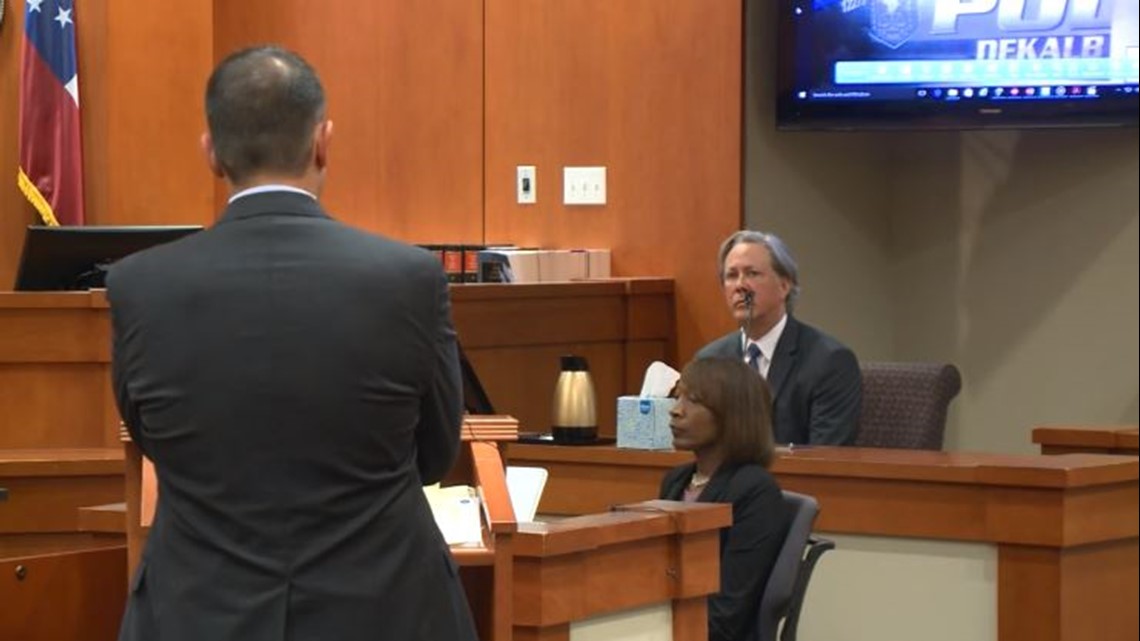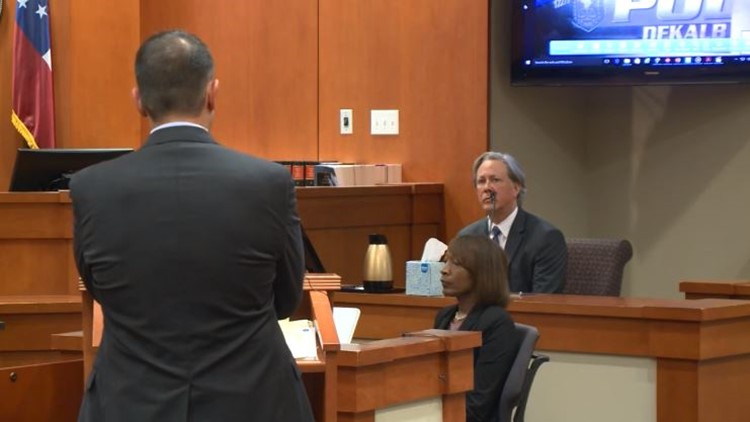DEKALB COUNTY, Ga. — During an immunity hearing for the officer accused of killing an unarmed, naked veteran in 2015, witnesses on both the defense and prosecution's side – including the officer himself – took to the stand to testify what they witnessed on the day of the shooting.
Back in March 2015, DeKalb County Police officer Robert Olsen responded to an apartment complex for a suspicious person call. When he arrived, Olsen said he encountered Anthony Hill, an Air Force veteran who had served in Afghanistan, who was naked and unarmed. Olsen said Hill "attacked" him, and, fearing for his life, he shot and killed Hill.
Hill's family said he was dealing with post-traumatic stress disorder.
PHOTOS | Anthony Hill
Nearly a year after the incident, a Grand Jury indicted Olsen for murder, aggravated assault, making false statements and violation of oath by a public officer. Pretrial motions were originally scheduled to start April 23, 2018, but were delayed until May 21.
ALSO | What is an immunity hearing?
During the Monday hearing, the DeKalb County courthouse was full with members of family for both Hill and Olsen.
Several witnesses, including one of the maintenance managers of the apartment complex, testified from that day. The manager witnessed the shooting and actually recalled seeing Hill both clothed and then naked, climbing from a balcony by way of pipes. The manager told the courtroom he called 911 three times for a suspicious person in the complex.
"He was just there saying strange things like, 'The devil is coming'," the man recalled, through an interpreter. "Then suddenly he said, 'Help me, help me.'"
He said he then saw Olsen's patrol vehicle enter the apartment complex and saw Hill run towards the police cruiser. Olsen was heard yelling to "Stop, stop!" but Hill continued to run towards the officer.
Griselle Torres, the apartment manager during the incident, stated another manager saw Hill knocking on the door of the office and that he was asking to come in, but she refused to let him inside. He was seen jumping up and down, so Torres decided to call 911.
Before this incident, Torres said that Hill was always respectful and kind.
In statements from the defense, Olsen's attorneys say the former officer would have thought of his training first in the situation.
"His training tells him that people who take off their clothes are experiencing excited delirium, possibility caused by drugs," the defense says. "People in those states can experience super human strength. He needs to be on high alert."
While the prosecution admitted Hill was acting unusually, they argued that he was never threatened anyone, and was therefore, not a threat.
"He was suffering from the health issue. He had a mental illness and he was off his meds. He was diagnosed with bipolar disorder," the prosecution presented. "He had no weapon. Not a stick, not a rock. He was moving quickly towards Robert Olsen and instead of waiting in his car, instead of trying to de-escalate or talk to Hill, he fired."
But according to Olsen's own testimony from the witness stand, he explained he had no hints that Hill may have been experiencing a mental break and new nothing of his background. He fired because he felt he was being attacked.
"Were you scared," attorneys questioned.
"Yes, sir," Olsen answered.
"Did you think you were being attacked," attorneys questioned further.
"Yes, sir," Olsen continued.
"Did you think you were about to be the victim of great bodily harm," Olsen was asked.
"Yes, sir," Olsen responded, tearing up on the stand.


Attorneys asked why the former officer opted not to use non-lethal means to control the situation. The former officer noted that he did not have time.
To use the pepper spray, Olsen explained someone would have to stand away from the person and hopefully not spray yourself. The other point is to prevent an attacker from taking an officer's sidearm in the process.
The second non-lethal weapon in an officer's arsenal is a baton, a telescoping impact weapon which extends to a length of 26 inches long when fully deployed. It is designed for use on soft tissue, but could be lethal when used to strike an unprotected skull, he said. To use, an officer must step forward to have the proper positioning to strike out with the baton.
A Taser is holstered and clipped on an officer's belt. In order to properly use it, an officer must reach across his body and detach it from its holster, activate the Taser, aim it so that the twin probes are pointed toward the target and then fire it.
For an officer to be able to effectively use a Taser, he must maintain an appropriate distance in order for the probes to have an opportunity to spread out and hit the target, Olsen said. He said he had tried unsuccessfully to use it on a previous occasion.
Olsen described the interaction with Anthony Hill unfolded in a matter of seconds.
"I get out of the car, he's running at me, I draw my weapon. I'm moving backwards and fast as I can. I yell, STOP! STOP! I believe I yelled it twice at least," Olsen testified.
Then came the two fatal shots. Olsen testified he never saw a weapon in Hill's possession.
Prosecutors pushed back with aggressive questioning, asking Olsen: "He never spit on you? Never hit you? Never swung at you? Or kicked you."
"No," Olsen replied.
During the proceedings, defense attorneys presented the radio traffic after the shooting as part of the case, in addition to witnesses testimony.
But the judge, not a jury, will ultimately decide whether Olsen acted in self defense.
RELATED


